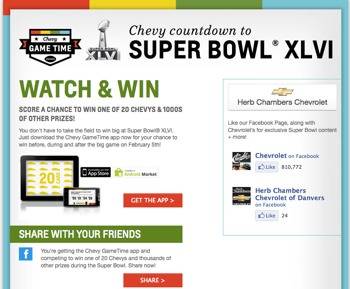There comes a time in the life of any startup where the founders look at each other, let out a sigh of relief and say, “we’re going to make it.” Startup founders and their first employees work countless hours making sure the product is functioning, helping clients and customers and responding to mini-catastrophes that crop up all over the place like wild fires during the Santa Ana winds.

The founders of Boston-based startup Promoboxx must be breathing that sigh of relief. Promoboxx has landed a deal with Chevy to power its Super Bowl commercials from local dealers. Yes, that Super Bowl. The one where Madonna is playing the halftime show this year. How did a little startup out of TechStars Boston make it to the biggest stage in the world?
Chevy will utilize the PromoBoxx platform to engage its 6,000 dealers with co-branded campaigns designed for each specific dealers. The commercials are being released before the Super Bowl and local dealers are given tools to promote their own specific version of the campaign online through email, Twitter, Facebook and their own websites.

Think about the logistics behind that for a second. That is 6,000 dealers with their own co-branded commercials. Each dealer has thousands of customers. That is a lot of very specific, locally targeted marketing going on. That means that Promoboxx’s platform needs to be very robust and scalable to deliver content at rates that size.
“We built it to be a cloud scalable platform that is able to handle practically simultaneous infinite users and large national brands” said Jamie Fiedler, lead engineer at Promoboxx.
To accommodate Chevy, Promoboxx had to create new user interface and unique experience for each of the 6,000 dealers. That is not easy. Promoboxx teamed with Big Fuel, a social media company out of New York, to handle the issue.
“The design and development team was updating the Promoboxx dealer engagement portion of the platform at the same time as they were revamping the entire product,” Promoboxx CEO Ben Carcio told ReadWriteWeb. Therefore, all of this new technology being developed will morph into the overall product offering. This made the Promoboxx technology team realize how flexible the product needed to be when working with such large brands, which forced them to build a Modular RESTful API.”
Promoboxx focused on creating a flexible backend to handle the needs of each specific dealer. This will be the biggest test for Promoboxx. With 6,000 dealers of varying degrees of technological prowess, the platform needs to be simple enough to be everything to everybody.
“The way the process works can vary per brand, so the importance of a flexible API/backend was super crucial. There wasn’t a defined path that every company or dealer would follow, so flexibility was an essential part,” said Fiedler.
Super indeed. Super Bowl that is. Promoboxx has likely hit an inflection point in its evolution. The company got its first big break. Now the real work starts.





















